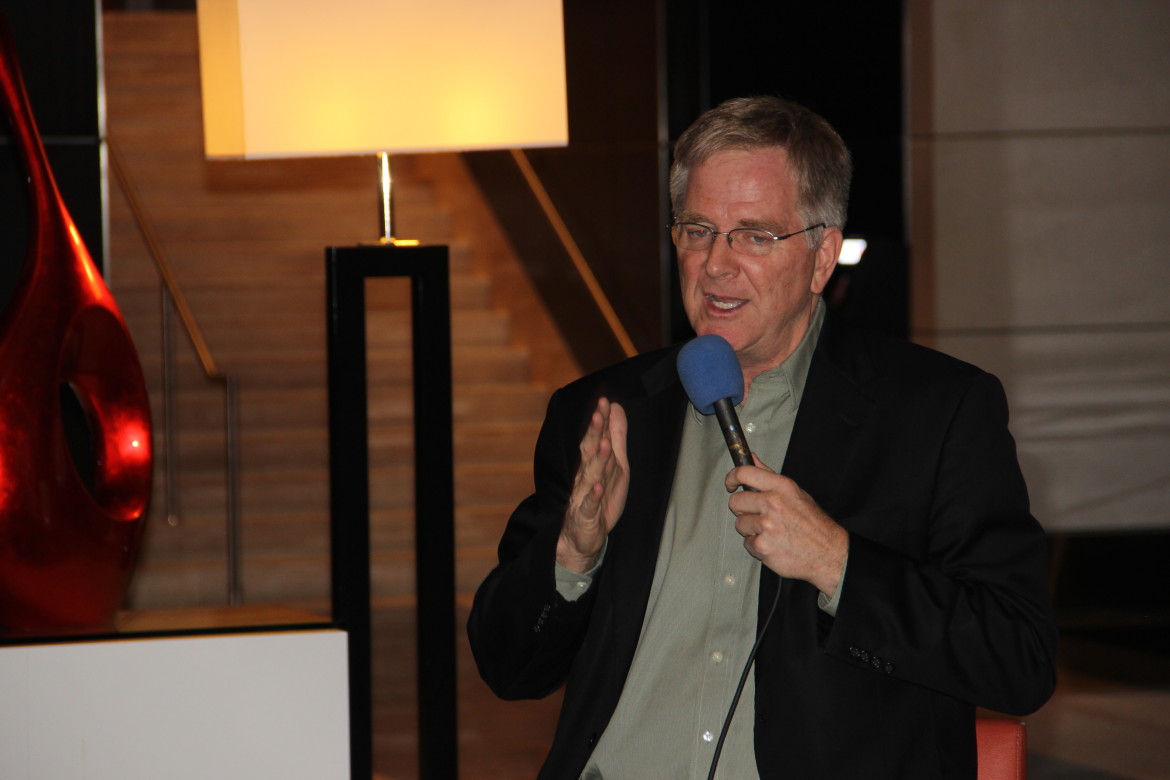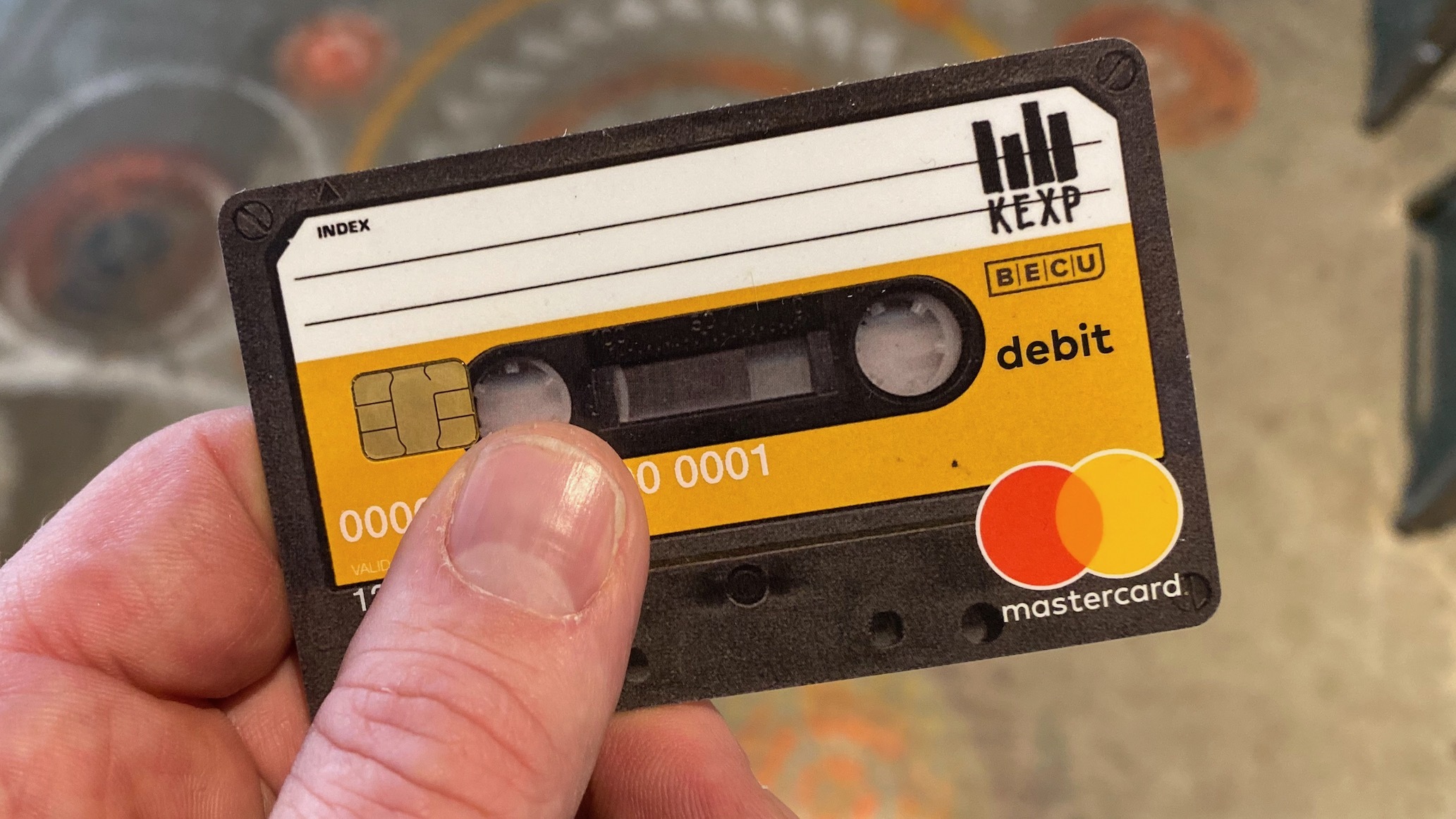Travel host Rick Steves describes a business model based on generosity

“I find that our country is more fearful now than it's ever been, and that really bothers me,” Steves said on The Pub. (Photo: Trevor Young, Georgia Public Broadcasting)

“I find that our country is more fearful now than it’s ever been, and that really bothers me,” Steves said on The Pub. (Photo: Trevor Young, Georgia Public Broadcasting)
The reigning king of public media travel shows, Rick Steves, charges public broadcasters nothing to air his programs. He also posts all of his episodes online for free, an extension of his passion to push Americans out of their bubble and get them exploring the globe. Steves appeared on our podcast The Pub in November, in an episode recorded live at the American Public Television Fall Marketplace in Atlanta, to discuss his business model, his enthusiasm for his work and more. He began by telling host Adam Ragusea what sets travel programming on public media apart from similar fare from commercial outlets.
Rick Steves: Just like I would say in a pledge drive, I can assume an attention span, I can respect people’s intellect, and I don’t need to worry about advertisers. I cannot dance around complicated issues, but I can deal with them. I know when people go to Europe, they’re looking for a free hotel here, a free ride there, and the tourist board is interested in promoting things that had the most investment the year before. So if a TV producer comes into some town and they have a new casino, they’ll assume you’re going to go to the casino, and they’ll wine and dine you and take you to the casino and just kind of assume you’ll put that in your show.
I was recently in Switzerland, and they had a casino they wanted me to go to, but I said, “No, I’d rather go to your heroin maintenance clinic.” Because I really wanted to show Americans how Switzerland was dealing with problems we’re dealing with, and I didn’t really want to be a shill for some tourist investment.
Adam Ragusea, Current: I joked about Vice before; that seems like the kind of thing that Vice would do, and it’s the kind of thing that Rick Steves would do. To me Vice, aside from its content, the presentation style is an extreme version of what has become of the norm of even most travel documentaries these days; it’s all about host immersion. The presenter is front and center saying, “I’m doing this; I’m doing that; I’m meeting so and so in the heart of wherever.” And in that Berlin episode that I played a clip from earlier, I counted literally 18 minutes go by before you utter the word “I.”
Steves: Really? That’s good because it’s not “I”; it’s my viewers. That’s what I want to do. I’m very passionate about accessibility. I was into accessibility before I was making TV. My whole mission is to make Europe accessible for the American that keeps going back to Orlando and is afraid to try out Portugal. These other commercial travel shows, they’re more like Jackass than they are a travel show. It’s just people doing freaky things that other people wouldn’t want to do, but they want to watch these guys doing it — and it is entertaining.
Bottom line, for me, is not entertainment. I mean, it sounds like the dad in khakis or something, but the bottom line for me is education. I have 3,000 words in 30 minutes for an episode, and I’ve got to teach you everything I can about the northern part of Ireland. That’s my challenge, and I don’t have a lot of time or words for goofy stuff that doesn’t teach people stuff. I want to inspire people to have an experience. I want to empower Americans to go over there and get out of their comfort zone. But I’m not really interested in theatrics. It makes good TV when you jump into the Dead Sea and put black mud all over your face, but there’s other stuff you can talk about when you’re in Palestine than that.
Current: Could you explain how your business model works? You offer your TV shows to stations for free, right? And your radio show, too? Where do you make money?
Steves: Right now I’m doing just what I was when I was a 20-year-old student at the University of Washington. I spend the summer traveling, I make all sorts of mistakes, I take careful notes, and I come home and I package the lessons from my mistakes into some kind of content that I can amplify. Originally it was giving lectures, then it was writing guidebooks, taking tours around, then it was doing TV, and now it’s doing radio also.
When I started my lectures, back when I was a kid, I’d charge people for the classes, and I found people — couples — were choosing one person or the other to take the class because they couldn’t afford both to take it. Or I’d offer a class and I’d have 50 people paying $10 each. I’d rather have 200 people paying nothing than 50 people paying $10 as long as I can cover my costs, and that’s my business model. Even way, way back when I was just a student, offer all the information for free, and then teach with all your heart and soul. I’ve got guidebooks that people can buy, and I’ve always been able to make money selling my guidebooks.
Current: Has the broader decline of the publishing industry messed with that model at all?
Steves: As far as publishing goes, my books are the best-selling books on the market for each destination in Europe because they’re old-fashioned: I go there in person and update everything every year. I make a lot of money on the royalties, and I put most of that back into updating them every year. It’s a business formula for the writing that other people could not sustain. A lot of people say publishing is in crisis; well, writing guidebooks is not in crisis. I’m selling more guidebooks now than ever. People wonder, are digital books or electronic books devastating print sales? I penetrate the market as well in electronic as I do in print; 10 percent of my royalties are electronic, and that’s kind of plateaued over the last couple of years, 10 or 15 percent.
Electronics is exciting, but there’s still a lot of guidebooks that are sold, and I’m not really too worried about the other guys. There’s no personality right now in America that a publisher has let become a household word. When I was a kid there was Fodor, Frommer, Fielding, Birnbaum — there were a lot of famous travel writers. In my generation, there’s not a lot of famous travel writers. In the last generation, publishers have taken royalties out of the equation, and they farm out the book to anybody who can go check that stuff and then they pay them as little as possible. It demoralizes the people who are doing that work, and what you get are guidebooks without a soul. I’ve got kind of hippie publishers that let me do my thing; they pay me a good royalty, and I think it’s good for their bottom line as well as mine.
Current: You are known for going from station to station and helping out with pledge drives. You’re very successful at helping out with pledge drives. Your products are really effective pledge premiums and, at the same time it further promotes your brand, which is makes it a win-win. But I got all of the clips that I’ve played from your show from YouTube; all the shows are there. How do you make the case for local stations in that new world?
Steves: How do I make the case for local stations for people to buy a premium with the shows, you mean?
Current: I literally could have watched all of your shows on YouTube for free.
Steves: I don’t know how that works, because why would you wait … I mean, if you’re inclined to watch it on a computer screen, you can just see it right now. My ethic is to make my stuff available, and I still have good carriage, and I still have good viewership. If I didn’t have good viewership, stations wouldn’t run me, but the shows are available online. And to answer your question, I don’t know why people watch it on TV, but they still do. And I’m thankful for that; everyone in the room is thankful for that, right? It’s a big market, and I always just feel that the more generous you can be with your information, if you’re passionate about it, it will provide for you the basis for keeping your business viable.
Current: Rick, over in public-radio–land, even the hosts of non-news programs typically try to avoid staking out positions on controversial issues. You are a big part of the reason why marijuana is legal in Washington State right now.
Steves: Thank you.
Current: You are associated with NORML, NARAL…
Steves: A board member for 10 years.
Current: You argued that terrorism is a logical outgrowth of the way that Americans project their power abroad — maybe you wouldn’t put it just that way. Do you ever hesitate to speak your mind, considering your very visible connections to public television and public broadcasting’s perpetual political vulnerability?
Steves: A frightening thing for me is that public broadcasting can be line-itemed out, I guess, with government funding and also with local corporate sponsors. We have to respect that, and we have to be careful about that. I understand that. My Holy Land show, Israel and Palestine, did not run on a couple of stations in this country because they had to be really careful about their sponsors and they didn’t want to offend people needlessly. I don’t fault them for that. It saddens me, but I am thankful that when I produced a show on the Holy Land, it did air on well over 90 percent of the stations repeatedly. I was just at a Jewish community center last night in Seattle talking to a hundred people about Palestine. They wanted to screen me before I got there, to make sure I didn’t say the wrong things, and I said, “No, I’m just going to come there and give you both narratives as I learned as a traveler.”
It’s in the same spirit as public television: We are the one station that has the broadcasting balls to call a spade a spade. I am very thankful for that, and I know there are stations who have had listeners say they’re going to write them out of their will because that station aired the show on Iran, or that station aired my show on the Holy Land, or that station showed somebody smokin’ a joint in Amsterdam. I know that public television is so true to mission that they will weather those little storms and know that truth is on their side. You’ve got to be careful that you don’t become an agenda journalist, but I’m not an agenda journalist — except for exposing Americans to the other 96 percent of humanity and reminding Americans that the world is not a pyramid with us on top and everybody else trying to figure it out. We find certain truths to be self-evident and God-given, and smart people find other truths to be self-evident and God-given. It’s in our own interest to get comfortable with that notion.
Current: Do you consider yourself a journalist?
Steves: It’s funny you ask that, because I haven’t considered myself a journalist for a long time, but I find myself being asked questions as if I am a journalist. What I do is I go to places hoping to bring home my experience and inspire people to either go there themselves or better understand them. I really find that a lot of Americans are ethnocentric, and they need to get more comfortable with the rest the world. I find that our country is more fearful now than it’s ever been, and that really bothers me. When I started traveling, people said, “Bon voyage.” Now they say, “Have a safe trip.” It’s actually safer to leave this country than to stay home, so I tell them, “Have a safe stay at home.”
But I just feel like the flipside of fear is understanding, and we gain understanding when we’re traveling, when we’re open to the world and when we spend less time watching commercial news and more time — if we’re going to watch TV — watching noncommercial television.
Current: Can we get an amen for that?
Steves: Amen.
Current: Question to Rick Steves?
Bradley George, Georgia Public Broadcasting: What I’ve always wondered is, you’ve been traveling for, what, 40 years or more?
Steves: I’ve been traveling since I was a teenager. My parents dragged me to Europe when I was 14 to see the piano factories in Germany; my dad imported pianos.
George: When you’re doing your shows and writing your books, how do you maintain just the sense of wonder and discovery about destinations that you visited dozens of times, and impart that to your listeners and viewers and readers?
Steves: That’s a very good question, because I spend four months in Europe, and if there was a downside of my work, it’s that I need to go back to the same places over and over to check them out. I’d much rather broaden my horizons and take the Trans-Siberian Railway, or go to the South Pacific, or who knows what. But I keep going back to Europe and keep going up the Eiffel Tower and keep marveling at the Sistine Chapel.
Part of my wonder is because I can forget and go back, and it’s like the first time. A great part of my wonder is the challenge of explaining it to my travelers so that they can go there and really understand the context. For 25 years, I was a tour guide, and I brought groups into these places. When you climb that spiral stair in the Sainte-Chapelle in Paris through the darkness, and then you open up into the most beautiful Gothic space in all of Europe, that’s a thrill for yourself. Now I scamper up there first, and I watch the wonders sweep over the faces of my travelers. That’s what gives me great joy, and that never gets old. It’s work, but it’s work that gives me energy.
I go for 60 days in the spring in the Mediterranean, and then I go home in June, and I go back for two months in July and August north of the Alps. When I’m over there, I literally work 60 12-hour days in a row. My staff asks for a day off every week, and I feel like they’re wimps, but I give it to them. But when I’m over there, it gives me energy.
Sarah, audience member: Earlier you said your business model was pretty much being so passionate and offering things for free, and then people want to be there. How did you get that to start, because I assume nobody can just do that for free to make money at the beginning?
Steves: My business model is something I don’t brag about; I don’t know how anybody could do it as I have. I don’t mean that I was brilliant; I’ve just been doing the same thing with the same exact focus for 30 years, and during the window of my career technology has really worked with me. Our TV crew is so small, it’s literally a closet in my office. We have to make up names and positions just so we have something in the credits.
I was doing it from the start, and I was a piano teacher in the beginning. It’s ironic — I don’t know what the word is — it’s just kind of beautiful. I’ve always had enough money, and I don’t need to make more money so I’m able to just do all these publicity stunts and teach with this enthusiasm and offer things for free. But I’ve always made plenty of money because, with that sort of energy, people want to give you money, I guess, so I sell a lot of tours and I give talks all over the country, and it just works out. If I could make more money charging stations for my show but 25 percent fewer stations would run my show, I would opt to have more people watch my show.
I honestly measure my profit by how many trips do I impact with one year’s work, and then the business works right after that. But I have to admit I’ve got a very good relationship with my publisher, I’ve got 30 guidebooks that I’ve written, I’ve got some business ethics that really work for me well. When I produce something I produce it to last a long time. I cannot imagine working for a TV station in a city that you produce something for one city that airs one time. That would be demoralizing to me, much as it would be worthwhile and gratifying, I suppose.
But I’m spoiled. I produce something, and it runs all over the country, and it airs over and over for 10 years. That lets me get up early in the morning and drive three hours just for one great wide shot, because I know it’s going to have that kind of reach and it puts me in a position which — we didn’t have this at the very start — where I can invest in the show to the degree that we can bring home shows that I’m really proud of.
Current: As the news producers in the audience weep, right?
Related stories from Current:










Rick Steves is an American treasure. The enthusiastically dorky uncle that you only later realize was actually the coolest one in your family.
Well said.
Rick Steve “My whole mission is to make Europe accessible for the American that
keeps going back to Orlando and is afraid to try out Portugal.”
I love Rick Steves, I was in Desert Storm and made friends with a guy from the Royal Air Force (Britain) and following the war, I started making trips to England every year, sometimes several times a year, and I absolutely loved it. I have no doubt that this opportunity changed me in a great way as far as my views and my outlook.
I especially liked Steves’ comments/views on the heroin maintenance clinics in Switzerland and how other cultures deal with common problems and I greatly enjoyed his comments about most travel shows and their inherent narcissism.
You should see Michael Moore’s new movie “Where to Invade Next” if you’re interested in how other countries deal with problems. It will blow your mind. Srsly.
I took a European Art History class from Rick Steves at the University of WA in 1982, and still have his book. I have had four amazing trips to Europe using his information as a guide. He was super cool then and even more so now. Everyone in Europe knows who he is. I “heart” that guy!
You are the best Rick , Much Respect for everything You do
I appreciate RS viewpoint that travel can help bring peace & understanding. As travelers open up to others & the experience new & different cultures it really can bring people closer together as a world community. RS is more than a travel guy, he’s an ambassador for greater human understanding that is so needed.